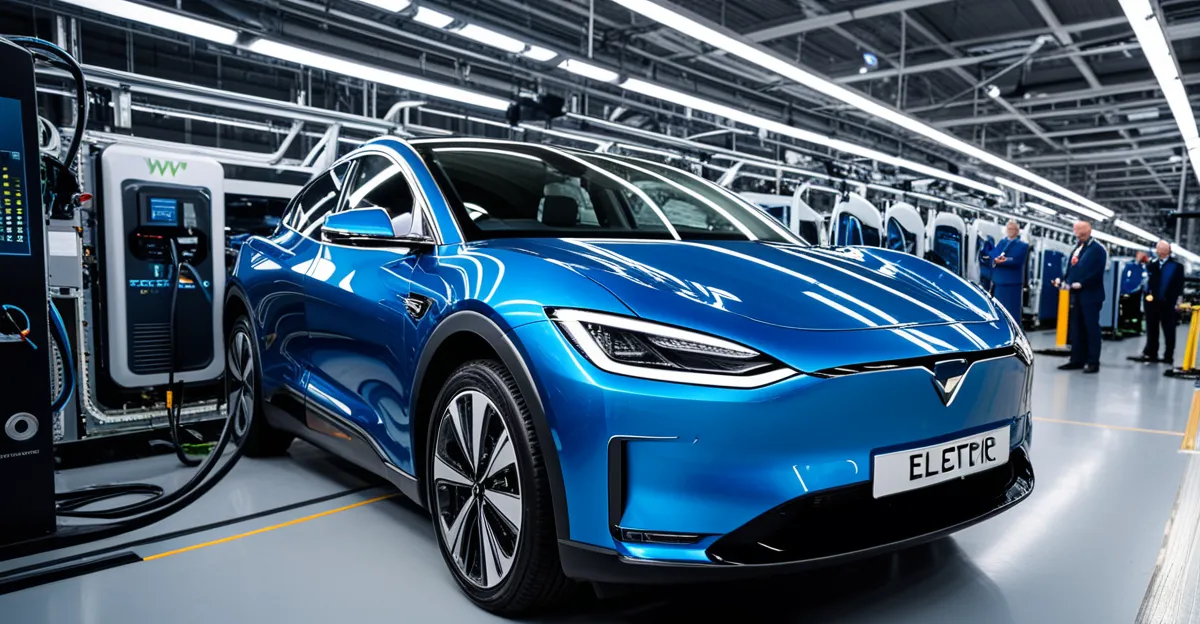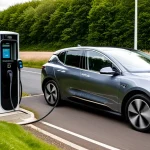Overview of Electric Vehicle Impact on UK Manufacturing
The adoption of electric vehicles (EVs) in the UK has been steadily increasing, driven by consumer demand and government incentives. This shift is reshaping the UK manufacturing industry. Traditional automotive manufacturers are now compelled to modify their production methods to accommodate EV technologies, impacting both infrastructure and workflow.
In comparison to conventional automotive manufacturing, the production of electric vehicles involves different sets of challenges and opportunities. A major difference lies in drivetrain complexity; EVs have simpler drivetrain systems, which generally involve fewer components. This simplification can reduce manufacturing mistakes and streamline production processes, though it requires significant investment in retraining the workforce to operate new machinery and technologies specific to EV production.
Topic to read : How is the UK addressing the shortage of charging infrastructure for EVs?
Moreover, the rise of electric vehicles has prompted a surge in industry trends related to sustainability and efficiency. Manufacturers must adapt to changing expectations around carbon emissions, pushing them to innovate their operations further. As electric vehicle adoption continues, it’s clear that the overall impact on the manufacturing landscape is profound, with long-term implications for traditional automotive sectors and new opportunities for innovation and growth.
Technological Advancements Driving EV Manufacturing
The evolution of EV technologies is fundamentally altering how electric vehicles are manufactured in the UK. Central to these innovations is the role of battery technology. Batteries not only dictate the range and performance of EVs but also significantly influence the manufacturing processes and costs. Innovations such as solid-state batteries promise greater energy density and faster charging times, necessitating changes in production techniques.
Also to read : How are UK car manufacturers incorporating AI into their production processes?
Moreover, advances in automation and robotics are streamlining EV production. Automated systems enable precise installation of components, reducing errors and enhancing efficiency. Robotics also facilitate the handling of complex tasks in the manufacturing of electric drivetrains and other intricate systems unique to EVs.
In addition, material science plays a crucial role in the sustainability and efficiency of EV manufacturing. Lightweight materials, such as advanced composites and high-strength alloys, are increasingly being used to reduce vehicle weight and improve energy efficiency. These materials also contribute to the sustainability goals by minimising the carbon footprint of production processes.
The combined effect of these technological advancements is a more flexible and efficient manufacturing landscape capable of adapting to emerging trends in EV technologies. This transformation not only aids in meeting consumer demands but also aligns with industry trends focusing on sustainability and innovation in the automotive sector.
Economic Implications of EV Adoption
The shift towards electric vehicles (EVs) is reshaping the economic landscape of the UK manufacturing sector. One of the critical economic impacts is the shift in job creation and displacement within the industry. While EV manufacturing introduces new roles and opportunities in innovation and technology, it simultaneously results in the decline of jobs linked to traditional combustion engine production. This necessitates a significant reorientation of workforces towards skills relevant to EV technologies.
Manufacturing investments are increasingly directed towards EV technologies, reflecting a marked transition in the sector’s focus. Companies are investing heavily in research and development, particularly in areas like battery technology and sustainable materials. This investment shift is crucial for maintaining competitiveness in a rapidly changing market.
As the EV sector continues to expand, the UK economy stands to benefit from predicted economic growth stemming from these developments. The demand for EVs drives not only manufacturing but also auxiliary industries such as charging infrastructure and maintenance services. This growth is supported by government incentives aiming to bolster the EV market, thereby fostering a conducive environment for long-term economic enhancement.
In conclusion, while the rising prominence of electric vehicles presents challenges, it also unlocks substantial economic opportunities for UK manufacturing. Companies and policymakers must work collaboratively to navigate these changes, ensuring workforce readiness and fostering innovation across the sector.
Workforce Changes in the EV Manufacturing Sector
The rise of electric vehicles (EVs) in the UK is bringing about significant shifts in the workforce development within the manufacturing sector. This transition requires a wide range of new skills to accommodate the advancing technologies used in EV production. As traditional assembly lines evolve, there’s a growing demand for expertise in electronics, software development, and battery management, contrasting sharply with the mechanical skills needed for conventional vehicle manufacturing.
To address these changes, a variety of educational and training programs are emerging, specifically tailored to equip workers with the competencies required for EV manufacturing jobs. Vocational training institutions and industry-based apprenticeships are focusing on cutting-edge areas like battery systems engineering and automated production systems. Such initiatives are critical in ensuring that the workforce remains competitive and capable in an increasingly technology-driven industry.
Despite these efforts, some challenges persist. The rapid evolution of EV technologies means continuous learning is essential. Manufacturers and educators must collaborate to ensure training programs keep pace with technological advancements. However, this transformation also presents opportunities for career progression and innovation, as workers are given the chance to engage with the latest technologies and contribute to a more sustainable future.
Adapting to the industry shift presents both challenges and opportunities for the workforce. While it necessitates significant adjustments in skill sets, it also opens doors for economic growth and the advancement of sustainable transportation technologies. As the UK auto sector continues to embrace this evolution, a well-trained workforce will be key to its success.
Environmental Considerations of Electric Vehicle Manufacturing
Electric Vehicles (EVs) present significant environmental benefits over traditional combustion engine vehicles, primarily due to their lower emissions during operation. The shift from fossil fuels to electric power helps reduce the overall carbon footprint of transportation, a critical factor in mitigating climate change. EVs contribute to cleaner air, as they produce zero tailpipe emissions, reducing urban air pollution and improving public health.
However, the environmental impact of sourcing materials for battery production cannot be overlooked. The extraction and processing of raw materials such as lithium, cobalt, and nickel pose substantial ecological challenges. These processes can lead to habitat destruction, water pollution, and significant carbon emissions, which complicate the sustainability narrative of EVs. Industries are actively seeking to minimise these impacts through advancements in recycling technology and sourcing sustainable materials.
In terms of long-term effects on climate change, the shift to EV manufacturing can significantly curb greenhouse gas emissions if coupled with renewable energy sources. Deploying clean energy in manufacturing further reduces the emissions associated with EV production, making the entire lifecycle more environmentally friendly. Industry trends currently emphasise closed-loop systems and green manufacturing practices, setting a precedent for sustainable production across automotive and other sectors.
Policy Effects on the Future of EV Manufacturing
The role of government policies in shaping the future of electric vehicle (EV) manufacturing in the UK is pivotal. Government incentives, such as purchase subsidies and tax breaks, are crucial drivers of EV adoption, making these vehicles more appealing to consumers and bolstering market demand. These policies not only encourage consumers to switch to electric but also push manufacturers to innovate and expand their EV offerings.
Regulatory frameworks, though supportive, present challenges for manufacturers. Stricter emissions standards and targets for zero-emission vehicles require manufacturers to adjust their strategies and operations to comply, often necessitating a shift in production priorities and increased investment in clean technologies.
Future projections suggest that existing policies and incentives, if maintained or expanded, could significantly accelerate the growth of the EV sector. By fostering a conducive environment for research and development, the UK can position itself as a leader in the global EV market. Enhanced government collaboration with private enterprises is vital to overcoming current barriers and sustaining the momentum towards sustainable transportation solutions.
Case Studies of Successful Electric Vehicle Manufacturing in the UK
Examining real-world instances of successful electric vehicle manufacturing within the UK provides insight into best practices and strategies driving the industry forward. Several companies have emerged as leaders by innovating and embracing new technologies to meet the growing demand for electric vehicles.
Company Spotlight: Leading UK EV Manufacturers
Notable among the pioneers is Jaguar Land Rover with its commitment to electrification, transitioning its lineup toward electric and hybrid models. The company has invested significantly in EV technology research, setting a benchmark in the industry. Another key player is Nissan, whose plant in Sunderland has become a key hub for producing the Nissan Leaf, combining innovation with scale to support the UK’s EV market.
Innovative Practices in Supply Chain Management
Supply chain management has seen considerable advancements, with companies adopting sustainable practices. For instance, some manufacturers have implemented closed-loop systems for battery recycling, ensuring that materials are reused efficiently. Moreover, partnerships with local suppliers have reduced carbon footprints and promoted regional economic growth, showcasing the potential benefits of collaboration.
Lessons Learned from Early Adopters
Early adopters of EV manufacturing have provided valuable insights into overcoming challenges in technology adaptation and workforce training. Continuous investment in skills development has been crucial, as illustrated by partnerships between manufacturers and educational institutions. These collaborations ensure a steady pipeline of qualified workers adept in EV technologies. The key takeaway is the importance of flexibility and adaptation to rapidly evolving market demands and technological advancements.










